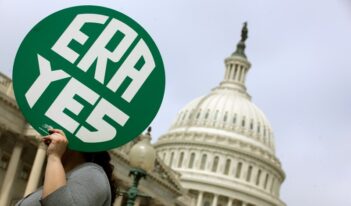
New York City ordinance that would regulate online home-sharing platforms hits a red light in federal court.
Regulators in New York City cannot compel home rental platforms like Airbnb to turn over user data for enforcement purposes—at least not for now.
Earlier this year, a federal judge enjoined a New York City ordinance that would have required online “home-sharing” platforms to surrender their business records on a monthly basis to the city’s Office of Special Enforcement (OSE). The court reasoned that it was likely that the ordinance violated the Fourth Amendment of the U.S. Constitution.
Home-sharing platforms are website- or application-based services that allow people to list and rent homes, such as Airbnb.
Under the ordinance, these services must routinely turn over hosts’ rental addresses and contact information, booking information for stays shorter than 30 days, and fees collected from these stays. Failure to share records with OSE can result in a fine of at least $1,500 for each unreported listing.
The ordinance, which was enacted in August 2018 and would have gone into effect on February 2, supplemented New York State’s Multiple Dwelling Law and various provisions of city housing regulations. Intended to reduce overcrowding and promote fire safety, sanitation, and ventilation, the Multiple Dwelling Law bans guests from renting apartments for fewer than 30 days, and it applies to rentals made through home-sharing platforms.
According to the city council, the ordinance would have helped regulators uncover violations of the Multiple Dwelling Law by allowing them to comb through the platforms’ rental data. In addition, supporters argue that the ordinance could help catch people who slip through tax and other regulatory loopholes by running “de facto hotels” through Airbnb.
But Airbnb, along with a similar platform called HomeAway, sued the city over the ordinance in federal court. Calling the ordinance an “unprecedented” form of municipal regulation, Airbnb alleged that the hotel industry had lobbied for the ordinance to force home-sharing services out of the city’s housing market. The platforms asked the court to stop the ordinance from going into effect, claiming, among other reasons, that the ordinance violated their Fourth Amendment right to privacy.
The court granted Airbnb’s preliminary request to suspend the ordinance pending litigation, persuaded that its Fourth Amendment argument was likely to succeed. Airbnb reportedly called the decision “a huge win.”
The court decided with “little difficulty” that the Fourth Amendment applied to the ordinance’s requirements. Even when regulators do not physically enter a business’s premises, the Fourth Amendment can still come into play, the court said. An agency’s request for business records can itself be enough for the constitutional right to privacy to apply.
In addition, the court cited a line of cases that applied the Fourth Amendment to agency searches of business records. For example, the U.S. Supreme Court has allowed agencies to compel businesses to turn over records for inspection as long as the agency’s request is narrow and specific.
The court added that the hospitality industry tends to have a greater a privacy interest than do more heavily regulated industries, such as the mining and firearm industries, where courts have previously allowed seizure of business records. Unlike those industries, hospitality services do not “involve inherently dangerous operations” or “have a history of pervasive regulation.”
The court also decided that the ordinance likely did violate the Fourth Amendment.
To be acceptable under the Fourth Amendment, a search must be reasonable. For instance, the court explained that an administrative subpoena—which legally forces the recipient to turn over records—can be reasonable as long as it has “a limited scope, a relevant purpose, and specificity in its demands.”
But the court found that the ordinance at issue was “the antithesis” of an administrative subpoena. Although it described precisely the data OSE could request, the ordinance would have applied to a substantial amount of data from every rental platform every month “into perpetuity.”
Moreover, the city did not cite any cases supporting this kind of broad, unindividualized government action. The court explained that regulators cannot “troll” records simply because a violation could appear somewhere within that trove of data.
“Existing Fourth Amendment law does not,” the court wrote, “afford a charter for such a wholesale regulatory appropriation of a company’s user database.”
In defense of the ordinance’s “sweeping scope,” the city argued that data collection would streamline OSE’s investigatory process by allowing it to find violators faster. But the court explained that the test for reasonableness of a search does not include “law enforcement efficacy.”
The also court noted that the ordinance did not give the platforms a chance for “precompliance review” of the data request. Typically, an agency must allow a business to consult a neutral arbiter to assess whether the request is reasonable before having to comply with it. Here, however, the ordinance did not identify where a platform could bring a privacy claim in response to a monthly data request.
Because the ordinance was so broad and because it did not establish a method for precompliance review, the court held—at least tentatively—that it was likely unreasonable.
But the court must still decide whether to block the ordinance permanently. Further proceedings in the matter have been scheduled for May—and New York City Mayor Bill de Blasio (D) reportedly expressed optimism still about the city’s prospects for winning the case.
Prior to the court’s suspension of the ordinance, the city issued a proposed rule that provides logistics for implementing the new law. The proposed regulation details how platforms would submit their records to OSE, how long OSE would keep those records, and how OSE would enforce the ordinance against noncompliant platforms, but the city has yet to take further action on this proposal.
But even without the ordinance or implementing regulations in effect, the city has still been working to combat various illegal home-sharing practices. In October, OSE carried out one such action in a condominium raid, alleging that 20 of the owners there had rented their apartments on Airbnb illegally. That condominium raid was one of the city’s largest enforcement actions.



